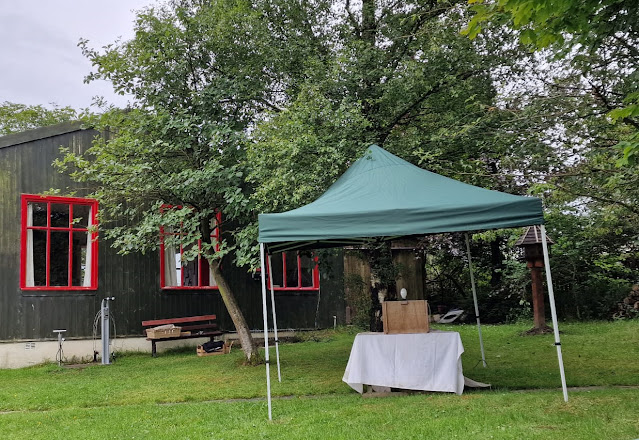The Safari has been trying to do some moth trapping both at Base Camp and further afield.
Our first attempt was for the Royal Society of Biologists at a nearby Country Park. Good pal CP did a fantastic warm up act for us with a great talk on bats that had one of the attendees in stitches laughing at the thought of Bat Ladders. Then outside as dusk drew darker the bats came out to play and put on a great show for us sending our bat detectors into a heated frenzy of sound...a superb start to the evening.
We were supposed to put the moth trap up on the green by the gardens once the bat excitement was over. Then everyone could sit round the sheets armed with a pot with which to catch the moths for us to identify as they came to the light. Well that never happened cos down came the rain by the bucketful. So 'indoor' moth trapping it was. The centre has a covered outdoor classroom at the back so it was in there that we set up out of the rain. The trouble with heavy rain is the moths don't like it and won't venture out - and who would blame them? A small number of hardy indivuals did appear, mostly Large Yellow Underwings and a few mico-moths. But we were trapping close to an Apple Tree which had attracted a goood number of Common Wasps. Fortunately we were using the sheet and light technique so could easily see them - it might have been a case of watch where you put your hands had we been coming to empty a box full of cold sleepy ones in the morning.
A few evenings later, after the rains had finished, we set the trap up at Base Camp and caught the grand total of ZERO moths - that's not in the rule books! The following night we tied again, rain wasn't forecast but we heard it lashing it down during the night - not a good omen -- just 6 soggy moths were in the trap come the morning. Things have got to get better, it's July for crying out loud!
For our next event we'd been invited by DSW, Community Engagement Officer for the Forest of Bowland AoNB Connecting People and Nature Project to lead a moth trapping and other wildlify bits n bobs event for one of her community groups...no way we could say no to that so with a car loaded up with all kinds of kit n kiboodle we headed off for the furthest reaches of East Lancashire aand the famous Witch country round the back of Pendle Hill.
We were taken to Clarion House, a community centre up in hills above the tiny village of Roughlee. To be honest the Safari has been to Australia more often than this part of east Lancashire so it's not surprising we'd never heard of the place until now. But what a lovely place and what a gorgous setting up on the hill overlooking the town of Colne down across the valley...that's if we could see that far, it was a grim old day.
 |
| Scalloped Oak |
 |
| Lesser Swallow Prominent |
 |
| Heath Spotted Orchid |
 |
| Heather |
 |
| Red Admiral |
 |
| Ringlet |
 |
| Small Tortoiseshell |
The bee we think could be Colletes succinctus, Heather Colletes by vitue of its presence in an upland habitat but we could be wrong. And we added the Greenbottle fly in to show that flies are very important pollinators but often overlooked or even disregarded in favour of bees and hoverflies. This week is Big Butterfly Count Week (that's probally why it's so cold wet n windy!) so we've put some butterfly pics in for you too.
To close here's a lovely arty shot that sums up the day very well.
A fantasic safari at a superb location we hope to visit again with a great bunch of people we hope to meet again soon. Huge thanks to DSWfor inviting us and providing some of the photos as we forgot our camera, although were too busy to take pics anyway, and to group member B for the use of her pics too - thank you very much.Where to next? The Safari will be heading north into the wilds of South Cumbria.
In the meantime let us know who's underwater in your outback.














































